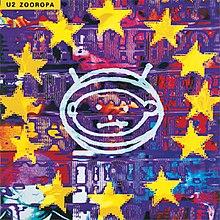Babyface (song)
| Zooropa | ||||
|---|---|---|---|---|
 |
||||
| Studio album by U2 | ||||
| Released | 5 July 1993 | |||
| Recorded | February–May 1993 in Dublin, Ireland | |||
| Studio |
|
|||
| Genre | Alternative rock | |||
| Length | 51:15 | |||
| Label | Island | |||
| Producer | ||||
| U2 chronology | ||||
|
||||
| Singles from Zooropa | ||||
|
||||
| Professional ratings | |
|---|---|
| Review scores | |
| Source | Rating |
| AllMusic | |
| Chicago Sun-Times | |
| Entertainment Weekly | A |
| Los Angeles Times | |
| The New Zealand Herald | |
| Orlando Sentinel | |
| Q | |
| Rolling Stone | |
| Spin | |
| The Village Voice | B− |
Zooropa /zuːˈroʊpɑː/ is the eighth studio album by Irish rock band U2. Produced by Flood, Brian Eno, and The Edge, it was released on 5 July 1993 on Island Records. Inspired by the band's experiences on the Zoo TV Tour, Zooropa expanded on many of the tour's themes of technology and media oversaturation. The record was a continuation of the group's experimentation with alternative rock, electronic dance music, and electronic sound effects that began with their previous album, Achtung Baby, in 1991.
U2 began writing and recording Zooropa in Dublin in February 1993, during a six-month break between legs of the Zoo TV Tour. The record was originally intended as an EP to promote the "Zooropa" leg of the tour that was to begin in May 1993, but during the sessions, the group decided to extend the record to a full-length album. Pressed for time, U2 wrote and recorded at a rapid pace, with songs originating from many sources, including leftover material from the Achtung Baby sessions. The album was not completed in time for the tour's resumption, forcing the band to travel between Dublin and their tour destinations in May to complete mixing and recording.
Zooropa received generally favourable reviews from critics. Despite none of its three singles—"Numb", "Lemon", and "Stay (Faraway, So Close!)"—being hits consistently across regions, the record sold well upon release and peaked at number one in multiple countries. The album's charting duration and lifetime sales of 7 million copies, however, were less than those of Achtung Baby. In 1994, Zooropa won the Grammy Award for Best Alternative Music Album. Although the record was a success and music journalists view it as one of the group's most creative works, the band regard it with mixed feelings.
...
Wikipedia
